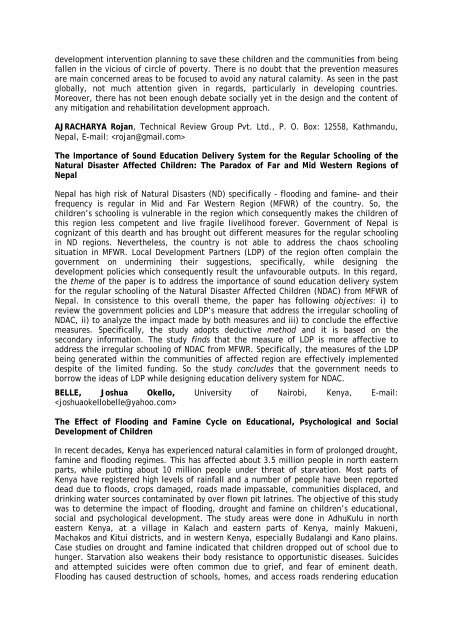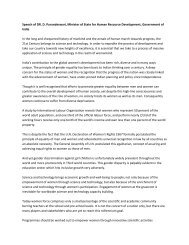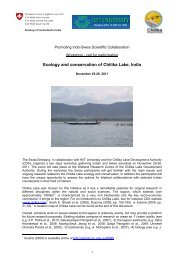PANEL ORGAN - KIIT University
PANEL ORGAN - KIIT University
PANEL ORGAN - KIIT University
Create successful ePaper yourself
Turn your PDF publications into a flip-book with our unique Google optimized e-Paper software.
development intervention planning to save these children and the communities from being<br />
fallen in the vicious of circle of poverty. There is no doubt that the prevention measures<br />
are main concerned areas to be focused to avoid any natural calamity. As seen in the past<br />
globally, not much attention given in regards, particularly in developing countries.<br />
Moreover, there has not been enough debate socially yet in the design and the content of<br />
any mitigation and rehabilitation development approach.<br />
AJRACHARYA Rojan, Technical Review Group Pvt. Ltd., P. O. Box: 12558, Kathmandu,<br />
Nepal, E-mail: <br />
The Importance of Sound Education Delivery System for the Regular Schooling of the<br />
Natural Disaster Affected Children: The Paradox of Far and Mid Western Regions of<br />
Nepal<br />
Nepal has high risk of Natural Disasters (ND) specifically - flooding and famine- and their<br />
frequency is regular in Mid and Far Western Region (MFWR) of the country. So, the<br />
children’s schooling is vulnerable in the region which consequently makes the children of<br />
this region less competent and live fragile livelihood forever. Government of Nepal is<br />
cognizant of this dearth and has brought out different measures for the regular schooling<br />
in ND regions. Nevertheless, the country is not able to address the chaos schooling<br />
situation in MFWR. Local Development Partners (LDP) of the region often complain the<br />
government on undermining their suggestions, specifically, while designing the<br />
development policies which consequently result the unfavourable outputs. In this regard,<br />
the theme of the paper is to address the importance of sound education delivery system<br />
for the regular schooling of the Natural Disaster Affected Children (NDAC) from MFWR of<br />
Nepal. In consistence to this overall theme, the paper has following objectives: i) to<br />
review the government policies and LDP’s measure that address the irregular schooling of<br />
NDAC, ii) to analyze the impact made by both measures and iii) to conclude the effective<br />
measures. Specifically, the study adopts deductive method and it is based on the<br />
secondary information. The study finds that the measure of LDP is more affective to<br />
address the irregular schooling of NDAC from MFWR. Specifically, the measures of the LDP<br />
being generated within the communities of affected region are effectively implemented<br />
despite of the limited funding. So the study concludes that the government needs to<br />
borrow the ideas of LDP while designing education delivery system for NDAC.<br />
BELLE, Joshua Okello, <strong>University</strong> of Nairobi, Kenya, E-mail:<br />
<br />
The Effect of Flooding and Famine Cycle on Educational, Psychological and Social<br />
Development of Children<br />
In recent decades, Kenya has experienced natural calamities in form of prolonged drought,<br />
famine and flooding regimes. This has affected about 3.5 million people in north eastern<br />
parts, while putting about 10 million people under threat of starvation. Most parts of<br />
Kenya have registered high levels of rainfall and a number of people have been reported<br />
dead due to floods, crops damaged, roads made impassable, communities displaced, and<br />
drinking water sources contaminated by over flown pit latrines. The objective of this study<br />
was to determine the impact of flooding, drought and famine on children’s educational,<br />
social and psychological development. The study areas were done in AdhuKulu in north<br />
eastern Kenya, at a village in Kalach and eastern parts of Kenya, mainly Makueni,<br />
Machakos and Kitui districts, and in western Kenya, especially Budalangi and Kano plains.<br />
Case studies on drought and famine indicated that children dropped out of school due to<br />
hunger. Starvation also weakens their body resistance to opportunistic diseases. Suicides<br />
and attempted suicides were often common due to grief, and fear of eminent death.<br />
Flooding has caused destruction of schools, homes, and access roads rendering education
















